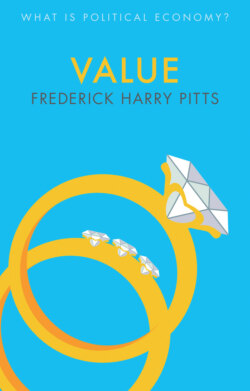Читать книгу Value - Frederick Harry Pitts - Страница 9
Mercantilism and Physiocracy
ОглавлениеSubstantialist theories of value first had real-world economic and political impact through so-called ‘balance of trade’ mercantilism, the ‘first appearance of a conservation principle in Western economic thought’.7 Mercantilism reacted to the shifting political economy of sixteenth- and seventeenth-century colonialism, wherein trade expanded and vast amounts of precious metals were extracted from colonies and transformed into currency. The latter came to convey wealth and prosperity, and the ‘production boundary’ between productive and unproductive was redrawn around ‘whoever bought, owned and controlled’ its supply. Where income was greater than expenditure, an enterprise was deemed productive, and those who drew down on this surplus as consumers without producing were deemed unproductive.8
The mercantilist understanding of the economy – which reappears today in the return of protectionist nationalisms – suggested that a system of equivalent exchange must always mean, in the words of Francis Bacon, that ‘whatever is somewhere gotten is somewhere lost’, justifying inter-country rivalry on the basis that ‘trade is a zero-sum game’.9 Value is here taken to be something conserved, and, to the extent that the exchange in which it features is conducted with the national currency, containable within the borders of the state from which it arose. Hence, the positive trade balance – back on the lips of the post-liberal right today – comes to represent the conservation and augmentation of the value substance.
Another element of classical substantialism that crops up in the intellectual imaginary of contemporary populisms of both right and left is the positioning of sections of the economy that are ‘productive’ of value against those that are ‘unproductive’ of value. Such a distinction is intrinsic to theories of value that rest on a ‘conservation principle’. No substantialism can successfully free itself of the presumption of the unproductiveness of one economic activity or another, because ‘the imposition of conservation principles in the context of a substance theory of value essentially dictates the existence of such categories’. The French physiocrats ‘were the first to make the postulation of unproductive sectors a hallmark of their analysis’, and from this it ‘became the hallmark of a substance theory of value’.10
The physiocrats were a mid-eighteenth-century school that sprang from the court of Louis XV in France, mainly gathered around the physician and royal advisor François Quesnay. Quesnay’s medical practice inspired a ‘metabolic’ vision of the economy, and specifically the role of agriculture within it. Quesnay was frustrated with the mercantilist policies of the French monarchy, which focused on trade and fundraising for military expenditure, rather than what he saw as the ‘productive’ agricultural sector.11 The physiocratic distinction of productive from unproductive had political implications, insofar as the ‘almost complete identification of productivity with the agricultural sector had an overriding aim. Their restrictive production boundary gave the landed aristocracy ammunition to use against mercantilism, which favoured the merchant class, and fitted an agricultural society better than an industrial one.’12 For a physiocrat such as Boisguillebert, the true value of things resided in the amount of labour-time that is expended in the production of the particular commodity, whilst the money that expressed different quantities of value in exchange ‘disturbs the natural equilibrium or the harmony of the exchange of commodities’. This is, in part, a result of the historical circumstances in which Boisguillebert operated, whereby the court of Louis XIV was characterized by a ‘blindly destructive greed for gold’.13 In language that invites evident parallels with present populist discourse, Boisguillebert referred to finance as a ‘black art’, championing a return to the ‘real economy’ long before it became fashionable to do so – indeed, around the time when such a distinction was still halfway plausible.
Assessing the contributions of Boisguillebert and others, Marx attributes to the physiocrats a laudable desire to investigate surplus value and relate it to labour-time, but without having first given thought to the form of value itself. In this way, the physiocrats were guilty of ‘discussing a complex form of the problem without having solved its elementary form’. This led to them ‘confusing the labour which is materialised in the exchange-value of commodities and measured in time units with the direct physical activity of individuals’.14
